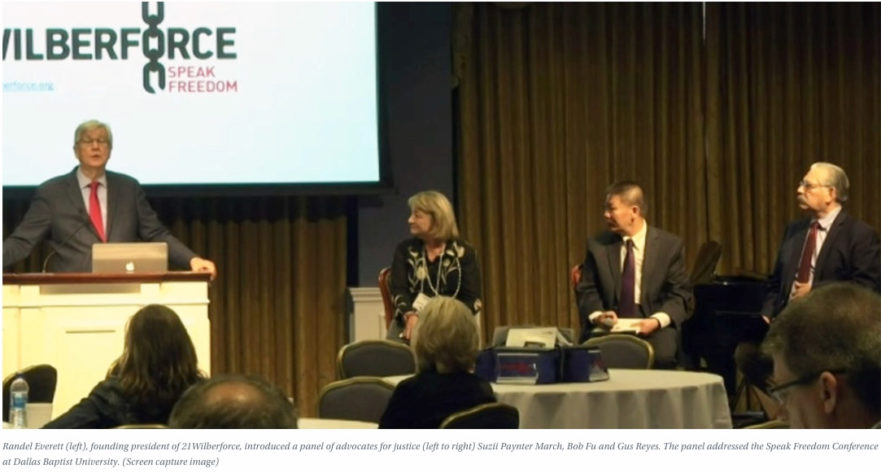April 14, 2021
Ken Camp
Leaders who want to transform society need the courage to take risks, the commitment to seek excellence and the compassion to advocate for the vulnerable and voiceless, panelists told the Speak Freedom Conference at Dallas Baptist University.
Pray for persecutors
Prayer unlocks God’s power to transform lives in countries where Christians experience intense persecution, said international evangelist Sammy Tippit; Getaneh Getaneh, founder of Watch and Pray Ministries; and Hormoz Shuriat, founding president of Iran Alive Ministries.
Tippit recalled examples of Christians in Romania filling a church to capacity on Sunday—not just for the worship service, but also for the prayer meetings before the time of worship.
Both Getaneh and Shuriat emphasized Christians who worship in difficult places understand Christ’s command to pray for those who persecute them—including praying for the salvation of those who consider themselves enemies of the church.
Seek excellence, take risks
Pastor Ralph West described the burden he felt for reaching the unchurched in northwest Houston and his passion for evangelism that led to the founding of The Church Without Walls 30 years ago. The church grew from 32 members to more than 9,000 worshippers who—when not restricted by a pandemic—gather on three campuses.
While COVID-19 has presented challenges for the church, it also has offered opportunities for having an impact on an expanded audience through creative online worship services, he noted.

Leadership demands creativity and a willingness to take calculated risks and learn from mistakes, said Drayton McLane, Baptist layman and billionaire businessman.
“You’re not really a big-idea leader if you’re not willing to make mistakes,” McLane said.
Dynamic leaders are curious, caring, courageous and committed to communicating their vision and leading according to their values, he emphasized.
“Start small, test your ideas, and make changes as you go,” he suggested.

Transformative leadership demands proximity, said Jeremy Everett, executive director of the Baylor Collaborative on Hunger and Poverty.
“You need to be immersed in people’s reality on a daily basis,” Everett said. “It’s incarnational. That’s how you cultivate trust.”
Effective leaders learn the importance of collaboration and cooperation with others who share common goals, and they possess a deep commitment to a cause, he added.
“Expect adversity,” he urged. “Don’t quit.”
Advocate for the vulnerable
Bob Fu, founding president of China Aid, described his personal journey—from an atheistic communist in China to a Christian advocate for religious and ethnic minorities in his homeland.
“In the last five years, we have seen the worst persecution in China since the Cultural Revolution,” Fu said.
Between 1 million and 3 million ethnic and religious minorities—primarily Uighur Muslims, but also Christians and ethnic Kazakhs—are detained in “modern concentration camps” in China, Fu said.
“We must seek religious freedom for all, not only for Christians,” he said.
‘What do you have?’
Suzii Paynter March, former director of the Texas Baptist Christian Life Commission and executive coordinator of the Cooperative Baptist Fellowship, recalled how she began involved in advocacy when she was a part-time adjunct professor at Baylor University.
The dean of Baylor’s School of Education knew she was president of the state association for teachers of reading. He asked her to go to Austin to lobby against a bill in the Texas Senate that would have done away with any School of Education in a Texas university.
The senator who introduced the bill to change the state’s education code chaired the committee that would consider whether to send it to the chamber for a vote, he added.
March recalled meeting with a seasoned consultant at the Capitol who wanted to know how much money her group had in its coffers for lobbying and how many powerful lawmakers she knew. Confessing she had neither money nor political influence, she said the political consultant leaned back in his chair and asked in a condescending tone, “Little lady, what do you have?”
At that moment, she recalled Jesus asking his disciples a similar question before he fed a multitude of more than 5,000 with five loaves of bread and two small fish.
She realized all she had in her “basket” was a network of schoolteachers. So, she found out the name of the first-grade teacher for each member of the Senate committee that was going to consider the bill that essentially would have killed the teacher-training programs in universities.
She contacted each of those teachers and urged them to talk to their former pupils who had grown up to be state senators.
When the chair of the Senate committee considering the legislation regarding changes to the education code called for a vote, the bill that powerful senator had championed was soundly defeated.
Advocacy for justice as mission
March urged Christian leaders to view justice advocacy in missional terms. Start with issues that grow naturally out of an individual congregation’s mission and ministries. Establish a long-term presence and build relationships with lawmakers, she suggested. Learn the language of public policy, and show decision-makers respect by speaking to them in a way they understand, she added.
Gus Reyes, director of Texas Baptists’ Center for Cultural Engagement, told the conference participants transformational growth doesn’t happen by accident.
“Systems deteriorate over time and need attention,” he said.
Take responsibility to seek a solution once a problem is discovered, he urged.
“Taking action can be humbling, and it can place us in a vulnerable position,” he warned.
Reyes urged persistence—both in advocacy and in prayer for those in elected positions of authority.
Reprinted by Baptiststandard.com

